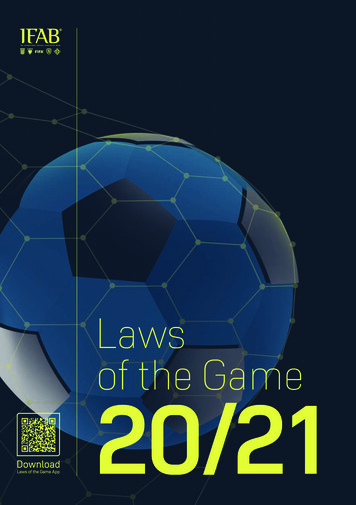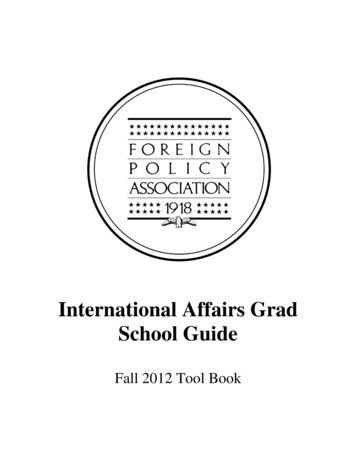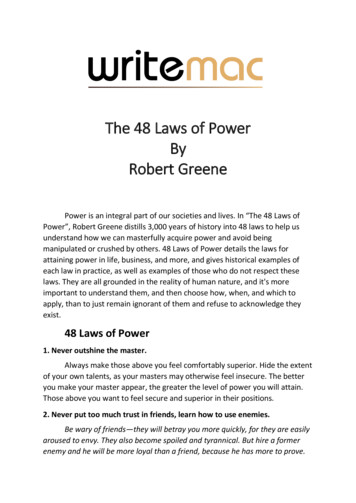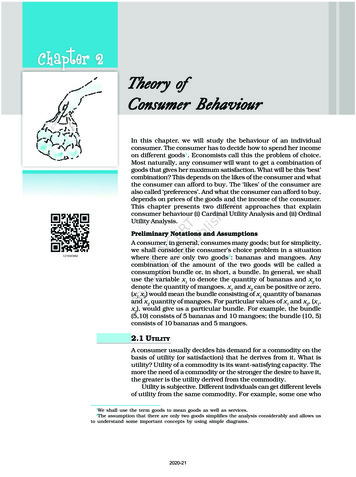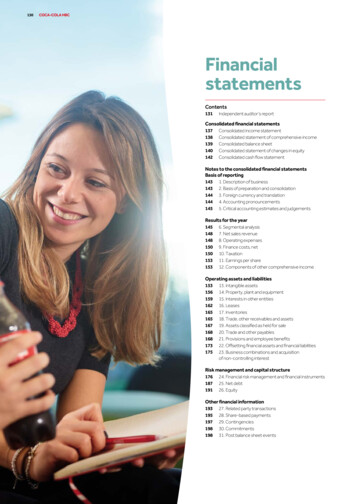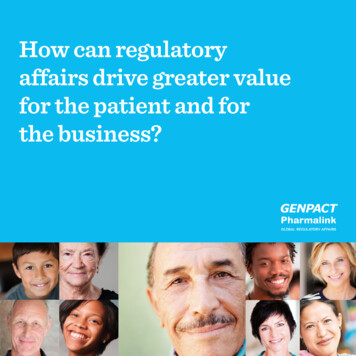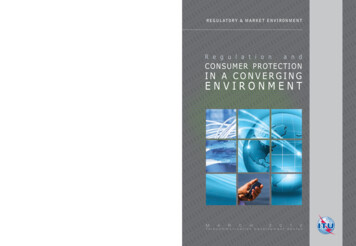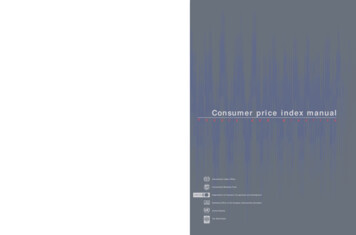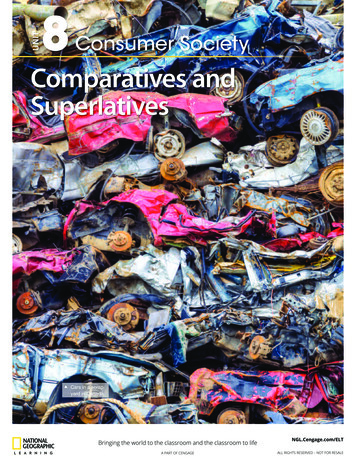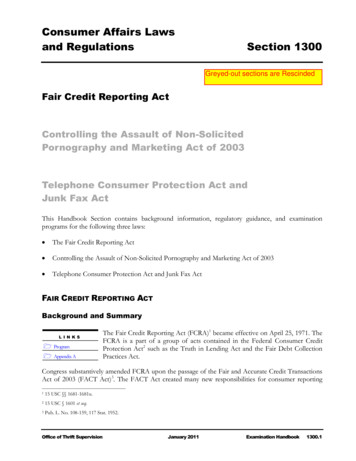
Transcription
Consumer Affairs Lawsand RegulationsSection 1300Greyed-out sections are RescindedFair Credit Reporting ActControlling the Assault of Non-SolicitedPornography and Marketing Act of 2003Telephone Consumer Protection Act andJunk Fax ActThis Handbook Section contains background information, regulatory guidance, and examinationprograms for the following three laws: The Fair Credit Reporting Act Controlling the Assault of Non-Solicited Pornography and Marketing Act of 2003 Telephone Consumer Protection Act and Junk Fax ActFAIR CREDIT REPORTING ACTBackground and SummaryL I N K S Program Appendix AThe Fair Credit Reporting Act (FCRA)1 became effective on April 25, 1971. TheFCRA is a part of a group of acts contained in the Federal Consumer CreditProtection Act2 such as the Truth in Lending Act and the Fair Debt CollectionPractices Act.Congress substantively amended FCRA upon the passage of the Fair and Accurate Credit TransactionsAct of 2003 (FACT Act)3. The FACT Act created many new responsibilities for consumer reporting115 USC §§ 1681-1681u.215 USC § 1601 et seq.3Pub. L. No. 108-159, 117 Stat. 1952.Office of Thrift SupervisionJanuary 2011Examination Handbook1300.1
Consumer Affairs Lawsand RegulationsSection 1300agencies and users of consumer reports. It contained many new consumer disclosure requirements aswell as provisions to address identity theft. In addition, it provided free annual consumer report rightsfor consumers and improved access to consumer report information to help increase the accuracy ofdata in the consumer reporting system.The FCRA contains significant responsibilities for business entities that are consumer reportingagencies and lesser responsibilities for those that are not. Generally, financial institutions are notconsumer reporting agencies; however, depending on the degree to which their information sharingbusiness practices approximate those of a consumer reporting agency, they can be deemed as such.In addition to the requirements related to financial institutions acting as consumer reporting agencies,FCRA requirements also apply to financial institutions that operate in any of the following capacities: Procurers and users of information (for example, as credit grantors, purchasers of dealer paper,or when opening deposit accounts). Furnishers and transmitters of information (by reporting information to consumer reportingagencies, other third parties, or to affiliates). Marketers of credit or insurance products. Employers.Structure and Overview of Examination ModulesWe structured the examination procedures as a series of modules, grouping similar requirementstogether. The modules contain general information about each of the requirements: Module 1 Obtaining Consumer Reports. Module 2 Obtaining Information and Sharing Among Affiliates. Module 3 Disclosures to Consumers and Miscellaneous Requirements. Module 4 Financial Institutions as Furnishers of Information. Module 5 Consumer Alerts and Identity Theft ProtectionsFinancial institutions are subject to a number of different requirements under the FCRA. The statutecontains some of the requirements, while others are in regulations issued jointly by the FFIEC agenciesor in regulations issued by the Federal Reserve Board and/or the Federal Trade Commission. AppendixA contains a matrix of the different statutory and regulatory cites applicable to financial institutions thatare not consumer reporting agencies.1300.2Examination HandbookJanuary 2011Office of Thrift Supervision
Consumer Affairs Lawsand RegulationsSection 1300Important DefinitionsThe FCRA uses a number of definitions. Key definitions include the following:ConsumerA consumer is defined as an individual.Consumer ReportA consumer report is any written, oral, or other communication of any information by a consumerreporting agency that bears on a consumer’s creditworthiness, credit standing, credit capacity, character,general reputation, personal characteristics, or mode of living that is used or expected to be used orcollected, in whole or in part, for the purpose of serving as a factor in establishing the consumer’seligibility for any of the following: Credit or insurance to be used primarily for personal, family, or household purposes. Employment purposes. Any other purpose authorized under § 604 (15 USC 1681b).The term consumer report does not include any of the following: Any report containing information solely about transactions or experiences between theconsumer and the institution making the report. Any communication of that transaction or experience information among entities related bycommon ownership or affiliated by corporate control (for example, different institutions thatare members of the same holding company, or subsidiary companies of an insured institution). Communication of other information among persons related by common ownership oraffiliated by corporate control if: It is clearly and conspicuously disclosed to the consumer that the information may becommunicated among such persons; and The consumer is given the opportunity, before the time that the information iscommunicated, to direct that the information not be communicated among such persons. Any authorization or approval of a specific extension of credit directly or indirectly by the issuerof a credit card or similar device.Office of Thrift SupervisionJanuary 2011Examination Handbook1300.3
Consumer Affairs Lawsand RegulationsSection 1300 Any report in which a person who has been requested by a third party to make a specificextension of credit directly or indirectly to a consumer, such as a lender who has received arequest from a broker, conveys his or her decision with respect to such request, if the thirdparty advises the consumer of the name and address of the person to whom the request wasmade, and such person makes the disclosures to the consumer required under section 615 (15USC § 1681m), Requirements On Users Of Consumer Reports. A communication described in subsection (o) or (x) of section 603 (15 USC § 1681a(o)) (whichrelates to certain investigative reports and certain reports to prospective employers).PersonA person means any individual, partnership, corporation, trust, estate, cooperative, association,government or governmental subdivision or agency, or other entity.Investigative Consumer ReportAn investigative consumer report means a consumer report or portion thereof in which information ona consumer’s character, general reputation, personal characteristics, or mode of living is obtainedthrough personal interviews with neighbors, friends, or associates of the consumer reported on or withothers with whom he is acquainted or who may have knowledge concerning any such items ofinformation. However, such information does not include specific factual information on a consumer’scredit record obtained directly from a creditor of the consumer or from a consumer reporting agencywhen such information was obtained directly from a creditor of the consumer or from the consumer.Adverse ActionThe term adverse action has the same meaning as used in § 701(d)(6) (15 USC1691(d)(6)) of the EqualCredit Opportunity Act (ECOA). Under the ECOA, it means a denial or revocation of credit, a changein the terms of an existing credit arrangement, or a refusal to grant credit in substantially the sameamount or on terms substantially similar to those requested. Under the ECOA, the term does notinclude a refusal to extend additional credit under an existing credit arrangement where the applicant isdelinquent or otherwise in default, or where such additional credit would exceed a previouslyestablished credit limit.The term has the following additional meanings for purposes of the FCRA: A denial or cancellation of, an increase in any charge for, or a reduction or other adverse orunfavorable change in the terms of coverage or amount of, any insurance, existing or appliedfor, in connection with the underwriting of insurance. A denial of employment or any other decision for employment purposes that adversely affectsany current or prospective employee.1300.4Examination HandbookJanuary 2011Office of Thrift Supervision
Consumer Affairs Lawsand RegulationsSection 1300 A denial or cancellation of, an increase in any charge for, or any other adverse or unfavorablechange in the terms of, any license or benefit described in section 604(a)(3)(D) (15 USC§ 1681b(a)(3)(D)). An action taken or determination that is: Made in connection with an application made by, or transaction initiated by, any consumer,or in connection with a review of an account to determine whether the consumer continuesto meet the terms of the account. Adverse to the interests of the consumer.Employment PurposesThe term employment purposes when used in connection with a consumer report means a report usedfor the purpose of evaluating a consumer for employment, promotion, reassignment or retention as anemployee.Consumer Reporting AgencyThe term consumer reporting agency means any person that, for monetary fees, dues, or on acooperative nonprofit basis, regularly engages in whole or in part in the practice of assembling orevaluating consumer credit information or other information on consumers for the purpose offurnishing consumer reports to third parties, and that uses any means or facility of interstate commercefor the purpose of preparing or furnishing consumer reports.MODULE 1: OBTAINING CONSUMER REPORTSOverviewConsumer reporting agencies have a significant amount of personal information about consumers. Thisinformation is invaluable in assessing a consumer’s creditworthiness for a variety of products andservices, including loan and deposit accounts, insurance, and utility services, among others. The FCRAgoverns access to this information to ensure that a prospective user of the information obtains it forpermissible purposes and does not exploit it for illegitimate purposes.The FCRA requires any prospective user of a consumer report, for example, a lender, insurer, landlord,or employer, among others, to have a legally permissible purpose to obtain a report.Office of Thrift SupervisionJanuary 2011Examination Handbook1300.5
Consumer Affairs Lawsand RegulationsSection 1300Permissible Purposes of Consumer Reports (Section 604) andInvestigative Consumer Reports (Section 606)Legally Permissible Purposes.The FCRA allows a consumer reporting agency to furnish aconsumer report for the following circumstances and no other: In response to a court order or Federal Grand Jury subpoena. In accordance with the written instructions of the consumer. To a person, including a financial institution, that the agency has reason to believe intends touse the report as information for any of the following reasons: In connection with a credit transaction involving the consumer (includes extending,reviewing, and collecting credit). For employment purposes.4 In connection with the underwriting of insurance involving the consumer. In connection with a determination of the consumer’s eligibility for a license or otherbenefit granted by a governmental instrumentality that is required by law to consider anapplicant’s financial responsibility. As a potential investor or servicer, or current insurer, in connection with a valuation of, oran assessment of the credit or prepayment risks associated with, an existing creditobligation. Otherwise has a legitimate business need for the information: In connection with a business transaction that the consumer initiates; or To review an account to determine whether the consumer continues to meet the termsof the account. In response to a request by the head of a State or local child support enforcement agency (orauthorized appointee) if the person certifies various information to the consumer reportingagency regarding the need to obtain the report. (Generally, this particular purpose does notimpact a financial institution that is not a consumer reporting agency.)Use of consumer reports for employment purposes requires specific advanced authorization, disclosure, and adverse action notices.Module 3 of the examination procedures contains these issues.41300.6Examination HandbookJanuary 2011Office of Thrift Supervision
Consumer Affairs Lawsand RegulationsSection 1300Prescreened Consumer Reports.Users of consumer reports, such as financial institutions, mayobtain prescreened consumer reports to make firm offers of credit or insurance to consumers, unlessthe consumers elected to opt out of being included on prescreened lists. The FCRA contains manyrequirements, including an opt out notice requirement when prescreened consumer reports are used. Inaddition to defining prescreened consumer reports, Module 3 covers these requirements.Investigative Consumer Reports (Section 606). This section on Investigative ConsumerReports contains specific requirements for use of an investigative consumer report. This type ofconsumer report contains information about a consumer’s character, general reputation, personalcharacteristics, or mode of living obtained in whole or in part through personal interviews withneighbors, friends, or associates of the consumer. If a financial institution procures an investigativeconsumer report, or causes the preparation of one, the institution must meet the followingrequirements: The institution clearly and accurately discloses to the consumer that it may obtain aninvestigative consumer report. The disclosure contains a statement of the consumer’s right to request other information aboutthe report and a summary of the consumer’s rights under the FCRA. The disclosure is in writing and is mailed or otherwise delivered to the consumer not later thanthree business days after the date on which the report was first requested. The financial institution procuring the report certifies to the consumer reporting agency that ithas complied with the disclosure requirements and will comply in the event that the consumerrequests additional disclosures about the report.Institution Procedures.Given the preponderance of electronically available information and thegrowth of identity theft, financial institutions should manage the risks associated with obtaining andusing consumer reports. Financial institutions should employ procedures, controls, or other safeguardsto ensure that they obtain and use consumer reports only in situations for which there are permissiblepurposes. Management should deal with information access, storage, and destruction under aninstitution’s Information Security Program; however, management must comply with FCRA in initiallyobtaining consumer reports.MODULE 2: OBTAINING INFORMATION AND SHARING AMONG AFFILIATESOverviewThe FCRA contains many substantive compliance requirements for consumer reporting agenciesdesigned to help ensure the accuracy and integrity of the consumer reporting system. As noted in thedefinitions section, a consumer reporting agency is a person that generally furnishes consumer reportsOffice of Thrift SupervisionJanuary 2011Examination Handbook1300.7
Consumer Affairs Lawsand RegulationsSection 1300to third parties. By their very nature, banks, credit unions, and savings associations have a significantamount of consumer information that could constitute a consumer report, and thus communication ofthis information could cause the institution to become a consumer reporting agency. The FCRAcontains several exceptions that enable a financial institution to communicate this type of information,within strict guidelines, without becoming a consumer reporting agency.Rather than containing strict information sharing prohibitions, the FCRA creates a businessdisincentive such that if a financial institution shares consumer report information outside of theexceptions, then the institution is a consumer reporting agency and will be subject to the significant,substantive requirements of the FCRA applicable to those entities. Typically, a financial institution willstructure its information sharing practices within the exceptions to avoid becoming a consumerreporting agency. This examination module generally covers the various information sharing practiceswithin these exceptions.If upon completion of this module, you determine that the financial institution’s information sharingpractices fall outside of these exceptions, you should consider the financial institution a consumerreporting agency and complete Module 6 of the examination procedures.Consumer Report and Information Sharing (Section 603(d))This section on Consumer Report and Information Sharing defines a consumer report to includeinformation about a consumer such as that which bears on a consumer’s creditworthiness, character,and capacity among other factors. Communication of this information may cause a person, including afinancial institution, to become a consumer reporting agency. The statutory definition contains keyexemptions to this definition that enable financial institutions to share this type of information undercertain circumstances, without becoming consumer reporting agencies. Specifically, the term consumerreport does not include: A report containing information solely as to transactions or experiences between the consumerand the financial institution making the report. A person, including a financial institution, mayshare information strictly related to its own transactions or experiences with a consumer (suchas the consumer’s payment history, or an account with the institution) with any third party,without regard to affiliation, without becoming a consumer reporting agency. The Privacy ofConsumer Financial Information regulations that implement the Gramm-Leach-Bliley Act(GLBA) may restrict this type of information sharing because it meets the definition ofnonpublic personal information under the Privacy regulations. Therefore, sharing it withnonaffiliated third parties may be subject to an opt out under the privacy regulations. In turn,the FCRA may also restrict activities that the GLBA permits. For example, the GLBA permits afinancial institution to share a list of its customers and information such as their credit scoreswith another financial institution to jointly market or sponsor other financial products orservices. This communication may be a consumer report under the FCRA and could potentiallycause the sharing financial institution to become a consumer reporting agency.1300.8Examination HandbookJanuary 2011Office of Thrift Supervision
Consumer Affairs Lawsand RegulationsSection 1300 Communication of such transaction or experience information among persons, includingfinancial institutions related by common ownership or affiliated by corporate control. Communication of other information (for example, other than transaction or experienceinformation) among persons and financial institutions related by common ownership oraffiliated by corporate control, if it is clearly and conspicuously disclosed to the consumer thatthe information will be communicated among such entities, and before the information isinitially communicated, the consumer is given the opportunity to opt out of thecommunication. This allows a financial institution to share other information (that is,information other than its own transaction and experience information) that could otherwise bea consumer report, without becoming a consumer reporting agency under both of the followingcircumstances: The sharing of the “other” information is done with affiliates. Consumers are provided with the notice and an opportunity to opt out of this sharingbefore the information is first communicated among affiliates.For example, “other” information can include information a consumer provides on an applicationform concerning accounts with other financial institutions. It can also include information afinancial institution obtains from a consumer reporting agency, such as the consumer’s credit score.If a financial institution shares other information with affiliates without providing a notice and anopportunity to opt out, the financial institution may become a consumer reporting agency subjectto all of the other requirements of the FCRA.GLBA and its implementing regulations require that a financial institution’s Privacy Notice containthe Consumer Report (Section 603(d)) opt out right.Other ExceptionsSpecific extensions of credit.In addition, the term consumer report does not include thecommunication of a specific extension of credit directly or indirectly by the issuer of a credit card orsimilar device. For example, this exception allows a lender to communicate an authorization throughthe credit card network to a retailer, to enable a consumer to complete a purchase using a credit card.Credit Decision to Third Party (for example, auto dealer).The term consumer report alsodoes not include any report in which a person, including a financial institution, who has been requestedby a third party to make a specific extension of credit directly or indirectly to a consumer, conveys thedecision with respect to the request. The third party must advise the consumer of the name and addressof the financial institution to which the request was made, and such financial institution makes theadverse action disclosures required by section 615 of the FCRA. For example, this exception allows alender to communicate a credit decision to an automobile dealer who is arranging financing for aconsumer purchasing an automobile and who requires a loan to finance the transaction.Office of Thrift SupervisionJanuary 2011Examination Handbook1300.9
Consumer Affairs Lawsand RegulationsSection 1300Joint User Rule.The Federal Trade Commission staff commentary discusses another exceptionknown as the “Joint User Rule.” Under this exception, users of consumer reports, including financialinstitutions, may share information if they are jointly involved in the decision to approve a consumer’srequest for a product or service, provided that each has a permissible purpose to obtain a consumerreport on the individual. For example, a consumer applies for a mortgage loan that will have a highloan-to-value ratio, and thus the lender will require private mortgage insurance (PMI) in order toapprove the application. An outside company provides the PMI. The lender and the PMI company canshare consumer report information about the consumer because both entities have permissiblepurposes to obtain the information and both are jointly involved in the decision to grant the productsto the consumer. This exception applies to entities that are affiliated or nonaffiliated third parties. It isimportant to note that the GLBA will still apply to the sharing of nonpublic, personal information withnonaffiliated third parties; therefore, financial institutions should be aware the GLBA may still limit orprohibit sharing under the FCRA joint user rule.Protection of Medical Information (Section 604(g))Section 604(g) generally prohibits creditors from obtaining and using medical information inconnection with any determination of the consumer’s eligibility, or continued eligibility, for credit. Thestatute contains no prohibition on creditors obtaining or using medical information for other purposesthat are not in connection with a determination of the consumer’s eligibility, or continued eligibility forcredit.Section 604(g)(5)(A) requires the federal banking agencies and NCUA to prescribe regulations thatpermit transactions that are determined to be necessary and appropriate to protect legitimateoperational, transactional, risk, consumer, and other needs (including administrative verificationpurposes), consistent with the Congressional intent to restrict the use of medical information forinappropriate purposes. On November 22, 2005, the FFIEC Agencies published final rules in theFederal Register (70 FR 70664). The rules contain the general prohibition on obtaining or using medicalinformation, and provide exceptions for the limited circumstances when medical information may beused. The rules define “credit” and “creditor” as having the same meanings as in section 702 of theEqual Credit Opportunity Act (15 USC 1691a).Obtaining and Using Unsolicited Medical Information. A creditor does not violate the prohibition on obtainingmedical information if it receives the medical information pertaining to a consumer in connection withany determination of the consumer’s eligibility, or continued eligibility, for credit without specificallyrequesting medical information. However, the creditor may only use this medical information inconnection with a determination of the consumer’s eligibility, or continued eligibility, for credit inaccordance with either the financial information exception or one of the specific other exceptionsprovided in the rules. We discuss these exceptions below.1300.10Examination HandbookJanuary 2011Office of Thrift Supervision
Consumer Affairs Lawsand RegulationsSection 1300Financial Information Exception. The rules allow a creditor to obtain and use medical informationpertaining to a consumer in connection with any determination of the consumer’s eligibility orcontinued eligibility for credit, so long as: The information is the type of information routinely used in making credit eligibilitydeterminations, such as information relating to debts, expenses, income, benefits, assets,collateral, or the purpose of the loan, including the use of the loan proceeds. The creditor uses the medical information in a manner and to an extent that is no less favorablethan it would use comparable information that is not medical information in a credittransaction. The creditor does not take the consumer’s physical, mental, or behavioral health, condition orhistory, type of treatment, or prognosis into account as part of any such determination.The financial information exception is designed in part to allow creditors to consider a consumer’smedical debts and expenses in the assessment of that consumer’s ability to repay the loan according tothe loan terms. In addition, the financial information exception also allows a creditor to consider thedollar amount and continued eligibility for disability income, worker’s compensation income, or otherbenefits related to health or a medical condition that is relied on as a source of repayment.The creditor may use the medical information in a manner and to an extent that is no less favorablethan it would use comparable, nonmedical information. For example, a consumer includes on anapplication for credit information about two 20,000 debts. One debt is to a hospital; the other is to aretailer. The creditor may use and consider the debt to the hospital in the same manner in which itconsiders the debt to the retailer, such as including the debts in the calculation of the consumer’sproposed debt-to-income ratio. In addition, the consumer’s payment history of the debt to the hospitalmay be considered in the same manner as the debt to the retailer. For example, if the creditor does notgrant loans to applicants who have debts that are 90-days past due, the creditor could consider the pastdue status of a debt to the hospital, in the same manner as the past-due status of a debt to the retailer.A creditor may use medical information in a manner that is more favorable to the consumer, accordingto its regular policies and procedures. For example, if a creditor has a routine policy of decliningconsumers who have a 90-day past due installment loan to a retailer, but does not decline consumerswho have a 90-day past due debt to a hospital, the financial information exception would allow acreditor to continue this policy without violating the rules because in these cases, the creditor’streatment of the debt to the hospital is more favorable to the consumer.A creditor may not take the consumer’s physical, mental, or behavioral health, condition or history,type of treatment, or prognosis into account as part of any determination regarding the consumer’seligibility, or continued eligibility for credit. The creditor may only consider the financial implications asdiscussed above, such as the status of a debt to a hospital, continued eligibility for disability income, etc.Office of Thrift SupervisionJanuary 2011Examination Handbook 1300.11
Consumer Affairs Lawsand RegulationsSection 1300Specific Exceptions for Obtaining and Using Medical Information. In addition to the financial informationexception, the rules also provide for the following nine specific exceptions under which a creditor canobtain and use medical information in it’s determination of the consumer’s eligibility, or continuedeligibility for credit: To determine whether the use of a power of attorney or legal representative that is triggered bya medical condition or event is necessary and appropriate, or whether the consumer has thelegal capacity to contract when a person seeks to exercise a power of attorney or act as a legalrepresentative for a consumer based on an asserted medical condition or event. For example, ifPerson A is attempting to act on behalf of Person B under a Power of Attorney that is invokedbased on a medical event, a creditor is allowed to obtain and use medical information to verifythat Person B has experienced a medical condition or event such that Person A is allowed to actunder the Power of Attorney. To comply with applicable requirements of local, state, or Federal laws. To determine, at the consumer’s request, whether the consumer qualifies for a legallypermissible special credit program or credit related assistance program that is: Designed to meet the special needs of consumers with medical conditions; AND Established and administered pursuant to a written plan that: Identifies the class of persons that the program is designed to benefit; and Sets forth the procedures and standards for extending credit or providing other creditrelated assistance under the program. To the extent necessary for purposes of fraud prevention or detection. I
Users of consumer reports, such as financial institutions, may obtain prescreened consumer reports to make firm offers of credit or insurance to consumers, unless the consumers elected to opt out of being included on prescreened lists. The FCRA contains many requirements, including an opt out notice requirement when prescreened consumer reports .
